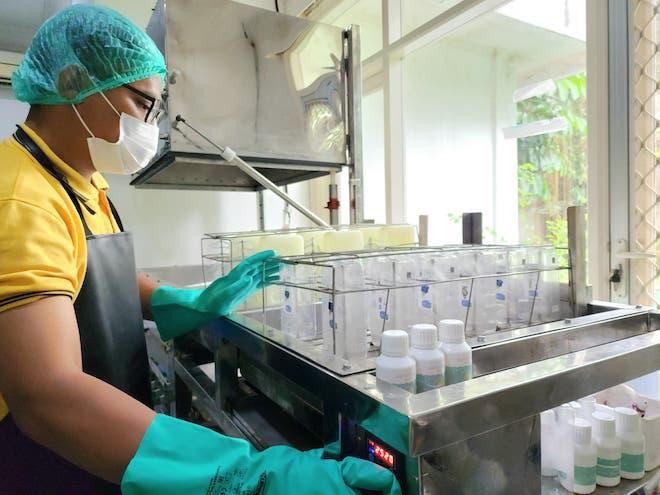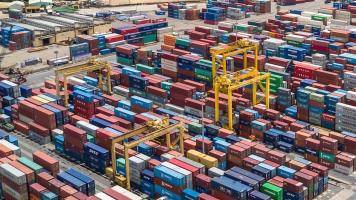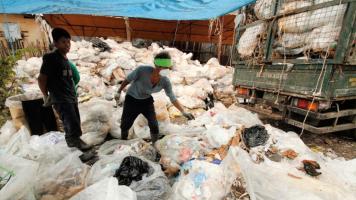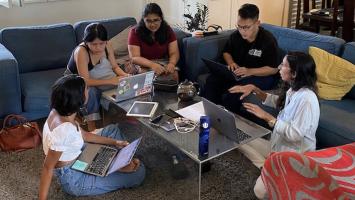To help reduce plastic wastes from households, Alner sells daily household essentials, such as shampoos, liquid soaps, and seasonings, in reusable bottles. Photo credit: Courtesy of Alner.
Alner sells essentials, like shampoos, liquid soaps, and seasonings, in reusable bottles to wean households from goods sold in sachets.
Bintang Ekananda has a mission: Wean Indonesian consumers from single-use plastics.
Typically, necessities like shampoo, soap, toothpaste, and coffee are sold in plastic sachets to make them more affordable to low-income consumers in emerging markets. Their packaging, however, presented a waste problem as the plastic used is hard to recycle.
In 2019, Bintang formed Alner, a social venture, which sells such goods in reusable packaging, in hopes consumers would refrain from buying their daily necessities in sachets in favor of greener alternatives.
“Economically, purchasing palm-sized sachets of shampoo or coffee powder is viable for several consumers in Indonesia, especially low-income consumers. The problem, however, is recyclers do not find value in these small sachets. The multi-layered packaging renders them difficult to recycle,” says Bintang, an environmental engineer.
A study by Indonesia’s Zero Waste Alliance estimates that each household in the country generates between 0.5 and 2 kilograms of sachet packaging waste per week.
Indonesia now ranks among the top 10 global plastic polluters, both on land and in the ocean, in part because of single-use plastics. According to the Indonesian government, in 2021, the country generated 68.5 million tons of waste, 17% of which are plastic rubbish. Less than 10% of the wastes are recycled, and most end up in landfills due to inadequate waste management system and ineffective recycling system.
To help reduce plastic wastes from households, Bintang came up with a deposit-return business model for Alner, which entails selling daily household essentials like shampoos, liquid soaps, and seasonings, in reusable bottles.
The startup entices customers to reuse containers by offering discounts. Alner is short for “alternative container” and is one of the ventures under international startup studio Enviu.
Between March 2020 and July 2023, Alner prevented about 100,239 single-use plastics from ending in landfills and oceans, based on calculation by independent verification body, Bintari Foundation.
The Alner story
Bintang was introduced to the concept of the deposit-return scheme while pursuing his master's degree in England in 2018. After some research, he learned how sachets end up in the oceans.
“Waste collectors do not earn much from selling these lightweight sachets, and the recycling process is time-consuming due to the multi-layered packaging,” he says. As a result, these sachet packets leak from the system into the environment.
Recycling alone does not address the root cause of plastic pollution, says Bintang. “We need to fix the leaking roof instead of just mopping the floor.”
How Alner works. Alner works with fast-moving consumer goods brands to supply refillable versions of their products to the startup.
The company also works with warungs, or local convenience stores, which serve as community-based points of sale. Gradually, it added bank sampah, or waste banks, and peer-to-peer agents among its points of sale, making it more convenient for consumers to find places where they can top up their daily essentials.
Alner offers daily essentials in returnable and reusable packaging made from recycled plastics (5% recycled PET and recycled high-density polyethylene), which can be reused up to 50 times.
The company employs a fully traceable distribution system, including a QR code system, and has integrated unique software solutions with partner companies and retailers to streamline the reverse logistics process.
Consumers can conveniently access Alner's reusable containers online or through the warungs and waste banks. After use, consumers can return the containers at designated drop-off points or sales points.
To ensure the containers are returned, consumers are incentivized with a cash-back. This allows consumers to buy the products at slightly lower prices (up to 10%).
Once the containers are returned, the company cleans them using eco-friendly materials and redistributes them to partner companies for refilling.

Empowering success: The impact of early-stage investment
Alner has gained some traction with its business model. Jakarta’s waste management system works with the startup to reduce the city’s plastic waste. In 2022, the Asian Development Bank (ADB) provided $450,000 in early-stage financing to the company after winning its Technology Innovation Challenge. The innovation challenge seeks to find new ways to address development challenges across ADB’s developing member countries through partnerships with technology providers.
Thanks to the ADB financing, between July 2022 and July 2023, the startup added 176 new sales points, improved its home delivery service, and implemented a reverse vending machine system to ensure reusables stay within the system. Its home delivery service now serves more than 1,000 end-users.
Alner used the ADB grant to enhance its digital platforms and technology for scaling. It designed and developed an enterprise resource planning system to streamline logistics and acquired a cleaning and sanitizing machine that can wash up to 40,000 containers a month as well as a reverse vending machine to enhance the return rate.
The startup has also provided opportunities for women in local communities. It partnered with Yayasan Rumah Pelangi, a local NGO that has been developing and supporting waste banks in Jakarta for over a decade, to train women leaders at waste banks. “We leveraged the NGO’s experience and community ties to provide more effective training to waste bank members, especially in the areas of digital marketing and communication skills. This enabled the women leaders to not only understand our system better but also educate their customers more effectively, thereby encouraging a switch to reusable products,” explains the 29-year-old entrepreneur.
Bintang sees bright prospects for the startup. In 2 years, he expects the company to empower 5,000 points of sales, generate $800,000 in revenues, serve 250,000 end-users, and create 121 jobs.
He is equally bullish about advancing Alner's mission. “By 2025, we want to prevent 50 million single-use packagings ending in landfills and oceans," he says.
About the Technology Innovation Challenge
The Technology Innovation Challenge (TIC) calls for technology providers to submit proposals that deploy innovative solutions to address a specific development challenge that ADB teams have identified. The winning proposal is awarded a grant to accelerate the implementation of the proposed technology solution. TIC is being implemented by the ADB Innovation Hub and is financed on a grant basis by the High-Level Technology Fund and administered by ADB.


